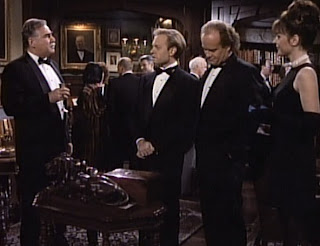
Niles: Well, as some illustrious person said, "popularity is the hallmark of mediocrity."
Frasier: You just made that up, didn't you?
Niles: Yes, but I stand by it.
It’s SeaBee time again! While the yearly awards show idea is a good story engine, the challenge is keeping it fresh. While the first SeaBee episode was about the actual politics of award-getting, “Someone to Watch Over Me” instead uses the SeaBees as a backdrop for a story about one of the perils of being famous. If celebrities and therapists both have to worry about people obsessing over them, you can imagine how bad it is for a radio shrink.
Kari (Renée Lippin) is Frasier’s #1 fan, and Frasier, being Frasier, admires the attention she lavishes on him. She calls him up on-air to congratulate him on his SeaBee nomination, and he doesn’t mind. She sends him a scarf as a gift (or rather sneaks it in his bag), and he doesn’t mind too much. Then she writes him a note saying she’s disappointed he didn’t wear the scarf and that the last man to disappoint her so died, and Frasier starts to think Kari is his #1 fan in the Kathy Bates sense. He doesn’t know who she is and has never seen her face, so he starts looking into bodyguards to make sure the award thing goes well. Roz can’t offer much help, partly because she is not an expert on personal security but also because she now has a zit on her nose that could guide Santa’s sleigh. (Daphne steps in to help there, which is how we get the image above.)
We know that things can’t get too dangerous, but there’s suspense of a sort. It’s not immediately obvious how the plot’s going to resolve, but it ends up being less about Frasier being stalked than how Frasier lets the idea of a stalker get to him. For once nobody discourages him from getting carried away; they all think Kari might be dangerous, and to be fair they’re not all wrong. A little caution is well-advised. But then they actually go to the awards and Frasier, bodyguard in tow, really goes to pieces.
In the meantime, the actual awards get neglected. It’s only in the credits sequence that we see Frasier and Roz actually win. I like that the show doesn’t fall into the trap of making the protagonists constant underdogs, which can start to feel contrived over the course of a long-running TV show. By keeping the win on the margins, the show dodges this cliché in as quick and painless a way as possible, establishing the Frasier and Roz are respected in their field without wasting too much time establishing it. (Following a misunderstanding with the head of the nomination committee, Roz remarks that they’re probably not going to be nominated again, but nothing seems to come of that.)
Since there’s only this one storyline (two is you count Roz’s nose trouble), and it’s kind of low-key, the whole episode feels a little slight. It’s not the most memorable, but it handles the story well; it’s to the writer’s credit that he don’t go as over the top as he could with the premise, handling it in an almost realistic way. A local celebrity has an over-enthusiastic fan, he gets spooked, he makes a fool of himself. FRASIER isn’t always low-key, and I’m not even sure the entire episode can be described as such, but it is when it needs to be, something sitcoms don’t always manage. “Someone to Watch Over Me” has some nice gags wrapped in an engaging story, and while it doesn’t reach great heights of hilarity, it’s definitely solid.
Guest Caller: John Lithgow as “Madman” Martinez
Written by Don Seigel
Directed by James Burrows
Aired March 28, 1995
Frasier: [about Roz's facial blemish] Have you considered wearing a beekeeper's mask?




